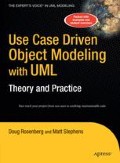Abstract
Imagine if everyone on your team was talking a different language. Let’s say you’re speaking German, your teammate is speaking French, and someone else is speaking Swahili. Every time someone speaks, people glean whatever slivers of meaning they can, and then nod as if they’ve understood perfectly. They then walk away with a completely wrong interpretation of what the speaker was really trying to say.
Access this chapter
Tax calculation will be finalised at checkout
Purchases are for personal use only
Preview
Unable to display preview. Download preview PDF.
Rights and permissions
Copyright information
© 2007 Doug Rosenberg and Matt Stephens
About this chapter
Cite this chapter
(2007). Domain Modeling. In: Use Case Driven Object Modeling with UML. Apress. https://doi.org/10.1007/978-1-4302-0369-8_2
Download citation
DOI: https://doi.org/10.1007/978-1-4302-0369-8_2
Publisher Name: Apress
Print ISBN: 978-1-59059-774-3
Online ISBN: 978-1-4302-0369-8
eBook Packages: Professional and Applied ComputingProfessional and Applied Computing (R0)Apress Access Books

